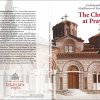Рођена је 10. јануара 1970. у Њујорку (САД), где је њен отац радио у Уједињеним нацијама. У породици математичара, оца Небојше, професора факултета и мајке Живане, професора у средњој школи, Алиса и сестра близнакиња Мирјана Марић-Стаменковић научиле су да играју шах веома рано, у узрасту од четири године.
Незнатно, само 21 минут млађа сестра—близнакиња Мирјана, такође је шахисткиња, велемајстор, бивша кадетска првакиња света и двострука првакиња Југославије у шаху. Поред тога, Мирјана Марић-Стаменковић је дипломирани математичар, а куриозитет представља чињеница да су сестре Марић једине сестре-близнакиње на свету које су носиоци велемајсторске титуле.
Марићева је дипломирала на Економском факултету y Београду, а 2001. године и магистрирала. На Факултету за менаџмент „Браћа Карић“ докторирала је 2004. године. Проф. др Алиса Марић на Факултету за културу и медије Универзитета Мегатренд предаје предмете Маркетинг и Оглашавање у медијима. Аутор је студентских уџбеника „Принципи маркетинга“ и „Маркетинг у медијима“.
Поред титуле женског велемајстора, носилац је и титуле интермајстора у мушкој конкуренцији.
На ТВ Политика (2003—2005. године) била је водитељ емисије „Алиса у земљи шаха“.
Добитник је највиших признања Републике Србије, Светосавске награде, која јој је додељена поводом двадесетогодишњице репрезентативне каријере, као и за изузетан допринос увођењу шаха у школе (званични је промотер акције Владе Србије „Спорт у школе“) односно Националног спортског признања за посебан допринос развоју и афирмацији спорта. Добитник је и највишег признања града Београда, Октобарске награде за 1988. годину.
Члан Председништва Олимпијског комитета Србије била је у периоду 2001—2008. године. Похађала је Олимпијску академију у Олимпији и била члан радних тела Европског олимпијског комитета.
На изборној листи 12. Првака света у шаху, Анатолија Карпова, уз представнике Русије, САД, Украјине, Малезије и Анголе, Алиса Марић је била кандидат Србије за потпредседника Светске шаховске федерације (ФИДЕ).
Фебруара 2011. године Алиса се остварила у улози мајке, доневши на свет близанце Милицу и Душана. Супруг јој је такође шахиста Јосип Ашик.
У својој дванаестој години постала је најмлађи шаховски мајстор у историји југословенског шаха, у петнаестој омладинска вицепрвакиња света, у шеснаестој сениорска првакиња Југославије (1986. године) и олимпијски репрезентативац, у осамнаестој велемајстор, а у двадесетој трећа шахисткиња света.
Најуспешнија је српска шахисткиња свих времена и једна од најуспешнијих шахисткиња у историји шаха.
Извор: Wikipedia





